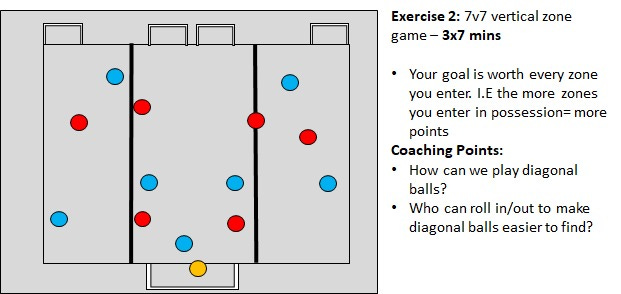How to Best Approach Playing Kids Up
Not what's the rush with putting all the kids up against older people?
Good morning! I want to talk about how to develop creative players.
If you haven’t already, please subscribe!
Enjoy the newsletter!
Exercise of the Week
Very simple exercise I’ve been having fun with that hits all key coaching points I look for when my team is in procession! Players like it too because sometimes you can get some crazy high scores because they kept possession so well.
When and How to “Play up”
We’re in such a rush to put kids up an age group to challenge them more. There are some instances where it makes sense to. When a player scores 10 goals a game and is physically bigger and faster than their peers, it makes sense to move them.
However, outside of genetic freaks, do we have any obvious ways of determining when to play a player up an age group?
Is the best dribbler and chance creator on your U11s going to be able to keep up with the pace of the U10 game? If you’ve coached youth soccer you know that this age gap can be devastating. Especially if the U11 is born in December and most of the U10 are born in the beginning of the year.
I like to use playing kids up for three reasons:
To challenge the player
To reward the player
To humble the player
Challenging the player is straight forward. If you have a superb athlete or an elite technician, the decision to go up an age group can be an easy one.
Rewarding a player is not done enough in my opinion. If a player has trained well and consistently, how do we reward this? Sometimes a pat on the back and a “good” isn’t enough.
I’ve put young players in good form up an age group to train in when I was certain they weren’t able to play at that level. The benefit of this is that the older players see a reward for good training, the younger player gets the reward, and the younger players teammates hear about the reward for quality training.
Humbling players can be a difficult choice to make, but sometimes players need to be shown that they aren’t good enough to have the ego they might. So, you put them up an age group, despite poor training quality and that the level up is far too fast for them.
They go to the training session against older players and struggle. And sometimes, we should let the player struggle if we are the ones controlling the environment. When a player with a big ego is exposed they have no choice but to be humble in the environment in which they were exposed.
This humbling experience should be done in if the older age group is
Aware of the young players abilities
Mature enough to help/guide the younger player in the session
Kind enough to understand that the younger player is struggling
I’ve seen kids do complete 180s by training with older players they had little business training with. They return to their own age group without any entitlement and are interested to improve.
Truthfully, I’m struggling to think of a time where it didn’t work as I write this.
And what if the arrogant player succeeds in the older session? Then perhaps their ego was deserved and we should challenge them by putting them up.
Conclusion
Thanks for reading this week! Please “like” this post by clicking the heart icon above. Substack will show this to more people if you like it, which means more paid members, which means more paid writers for this publication!
Once you’ve liked this, share this newsletter with a friend or every single person you have ever met.





